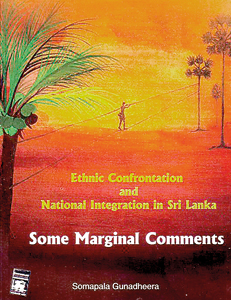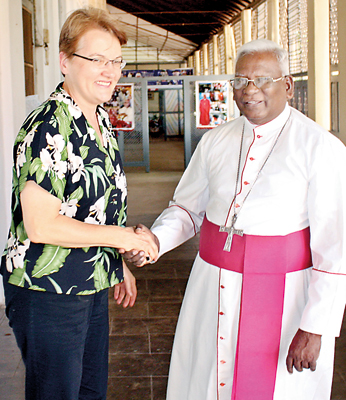This author stands tall in showing the way to right the wrongs
Those who have read Somapala Gunadheera’s frequent articles in Groundviews or in the newspapers would, I am sure, have no hesitation in hailing him (as I once did), as a sane voice amidst all the cacophony of our times. It is very satisfying to find that this collection of articles written over the years 2004 to 2011 is now available in permanent form in a well-produced book.
As I opened the cover, my eye was arrested by the dedication “to Krishanti Kumaraswamy – as a symbolic expression of remorse and apology to the innocents on all sides who suffered loss and damage in our mindless communal conflict.”
The broad humanity of this writer who recognises no artificial barriers of race or religion, came through in that dedication. Krishanti Kumaraswamy, for those who need an explanation, was an 18-year-old sitting her A/Levels when she was stopped at a military checkpoint in Jaffna one day in1998 (if memory serves me right), and never seen again.
Her mother and brother came with a neighbour to the checkpoint to inquire about her and that was the last time any of them were seen alive.

The newspapers gave full publicity to the horrendous crime and a soldier was brought to trial. I must confess, however, that I don’t know how the story ended – whether justice was seen to be done or not. Then I turned to Gunadheera’s Preface, at the end of which he writes: “I am glad Dr. Rajan Hoole kindly agreed to write a Foreword to this book. Being my hero and role model in the North, he was my spontaneous choice for the job. I have always admired Dr. Hoole’s courage to stand by his convictions and his ability to see both sides of the picture, dauntless of the dangers of such predilections.” The same characteristics of courage and fairness typify both men. Readers will be aware that Dr. Rajan Hoole, together with the late Dr. Rajini Thiranagama and a few other academics, was responsible for the candid revelations and observations regularly made by the group known as University Teachers for Human Rights, (Jaffna) (UTHR-J), who spoke the truth as they saw it, without fear or favour, and which cost Rajini her life.
Straightaway, the tone of the book may be anticipated. It’s not surprising that the opening chapter gives excerpts from an address given by Gunadheera, then G.A. Trincomalee, and Chairman of the Reception Committee at a session of the All-Ceylon Buddhist Congress held there in, I believe, 2004. Gunadheera’s whole life and attitude bears witness to his deep devotion to the teachings of the Buddha. He is a true Buddhist who “walks the talk”. So, he declares that “To attempt to preserve Buddhism by violence is paradoxical, for whatever one preserves by violence cannot be Buddhism.”
However, he goes on to stress how vitally important it is that the Buddhists of Ceylon spare no effort to preserve the nation in order to safeguard Theravada Buddhism “in all its pristine purity”, for otherwise it would be lost to the world. As a non-Buddhist myself, I cannot presume to make any judgement, but I can’t help wondering whether there isn’t a dichotomy here. If it signifies that the writer advocates or justifies Buddhism being given “the foremost place” in our Constitution, it also seems to me that if the majority community becomes preoccupied with preserving the status quo of Buddhism, a natural consequence would be that there is little chance, then, of equal treatment for the minorities, whether racial or religious.
It’s evident that when the Peace talks fluctuated in 2004, Gunadheera was not optimistic that the LTTE could be militarily defeated. He doesn’t hesitate to make a bold suggestion as to an eminently suitable person to hold the balance and act as Moderator between the two sides at the negotiating table.His choice is Jayantha Dhanapala, whom he describes as “A super diplomat good enough to be nominated to head the UN”.
However, in the event of the armed conflict being renewed despite genuine efforts to avert it, the writer’s succinct observation was that “The heroes of the South who have been raring for a showdown will have their day to show their bravery through other people’s children, though not forcibly conscripted from their mothers’ bosoms.”(!)
Gunadheera started his career in the Civil Service as a cadet attached to the Jaffna Kachcheri. He retains happy memories of the pleasant life he led “among hospitable and peace-loving people.”
And when, some time later, he was summoned by President Chandrika Kumaratunga who requested him to go back to Jaffna to take charge of the civil administration there, since the public servants in Jaffna had followed the exodus of the population to the Wanni in the wake of the retreating LTTE cadres, Gunadheera acceded to her request without hesitation.
He handled the onerous situation arising from “Riviresa 11” when all the people who had fled to the Vanni, over 250,000 of them, started to trek back to Jaffna, “exhausted and hungry” after walking for miles and presenting “a pitiable sight, a people reduced to nomads and refugees in their own land”.
The G.A. also returned and Gunadheera tackled the problem of feeding and taking care of them with consummate tact and skill, ably assisted by retired army officers. He also mentions seeing the broken bodies of soldiers being brought by ‘plane from the battlefield to Palaly and says: “Calamity is no respecter of persons……….It is my direct personal experience of human suffering like this that has prompted me to look at our ethnic conflict beyond the dividing fence.” He has no doubt that his survival in Jaffna at that time owed much to the a political stance he consistently maintained.
I was impressed by the reply he gave to a reporter from the Tamil paper, `Udayan’, who asked Gunadheera about his own response to the war: “I have not come to choose a king for the Tamils. My mission is to see that the king would have living subjects when he arrived after the conflict is resolved.”
In reviewing a book of this nature, the temptation is strong to keep quoting the author’s wise counsel in his own words. His compassion and sensitivity to others’ feelings shines through his writing. He is unbiased and in this I am reminded of another work I recently read by an equally impartial observer of events in the North and East, Ben Bavinck whose book, “Of Tigers and Tamils – a journey through Sri Lanka’s war years”, recounts his own experiences over the many years during which he worked for the National Christian Council of Sri Lanka, overseeing the transport of lorry-loads of food to both regions – a task both tedious and hazardous.
Gunadheera writes of instances where ordinary soldiers and officers conducted themselves in a such a way as to make us feel proud of them.
At war’s end, Gunadheera’s writing focuses on the need for good governance and a genuine attempt to heal the wounds on both sides, with the avowed goal of building a united nation in which all the minorities would enjoy equal rights with the majority community.
He deplores procrastination on the Government’s part in not even setting a time frame for things to get moving. Another assertion made by Gunadheera struck me forcibly as most encouraging when I first read the article in which he said it. Going by the Buddha’s teaching that hatred is not overcome by hatred, he advocates a display of loving kindness towards the diaspora and to their kith and kin in Jaffna as the surest way to bring back the Tamil diaspora into the fold.
Gunadheera’s stance is that if the Govt. would move quickly to set right the perceived wrongs which irk the Tamils with regard to issues such as language, education and decentralisation in keeping with the rest of the country, the Diaspora might well be “transformed into a national asset”.
It’s not an Utopian idea and is one that should appeal to all who are for reconciliation and lasting peace. Another instance of his far-sightedness is seen in his boldly saying that “Decentralization” might be understood as “an exercise to enable people who were traditionally living as a majority in an identifiable area for an immemorial time, to manage their own political organisation democratically, in that area, subject to recognizing the sovereignty of the country as a whole.”
The concluding article, written in August 2011, is entitled “A Positive Approach to `Darusman’. Many people publicly expressed their outrage at the allegations made in that Report. Here again, Gunadheera keeps his cool and writes calmly and reasonably, pointing out that the most effective response on our part –one that would pre-empt outside attempts at intervention – would be the official launching of an investigation of our own to establish the truth. Furthermore, he makes a pragmatic proposal that an independent Tribunal, not of the President’s choosing, but of people named by Parliament by consensus of both sides should be appointed. He enlarges on this concept and explains his reasons.
Some might think such a statement naïve, but it seems to me to be grounded on an inescapable truth when Gunadheera avers that “What ultimately works is the milk of human kindness that is basic to every religion and is found in greater measure among the less sophisticated.”
If only we humans would apply the fundamental truth contained in the faiths we profess, to treat others as we would like them to treat us, strife and conflict would surely cease? In an article written in May 2009, with the surprise heading of “Father, forgive them ……..” , Gunadheera again says something significant: “If we are really serious about nation-building, we must not begin with a witch-hunt. Let us begin with equanimity and turn over a new leaf with no blots on it from the past. Forgiveness is the umbilical cord of the new Sri Lanka, struggling to be born.”
If I have inadvertently made the writer out to be an impractical idealist with his head in the clouds, I have sadly misrepresented him and failed to do justice to a book that fully deserves our serious attention and a permanent place on our bookshelves.
Gunadheera stands tall, with his feet firmly planted on the ground, uttering words of wisdom that would point the way to Sri Lanka becoming, indeed, “the miracle of Asia” at a higher level than that of mere material development alone.
-Anne Abayasekara
Follow @timesonlinelk
comments powered by Disqus



























